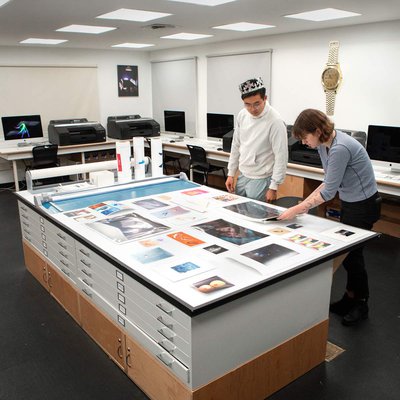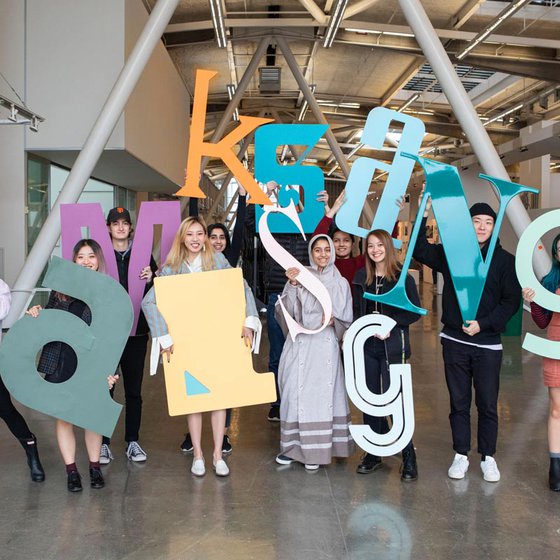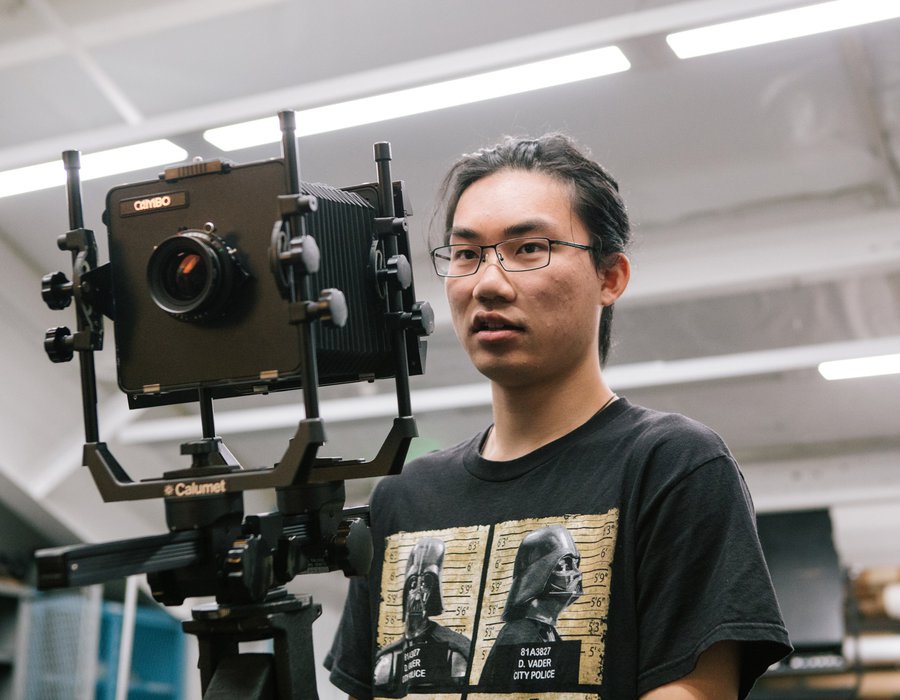
BFAPhotography
Learn photography from world-renowned artists and collaborate with designers, printmakers, and more.
Overview
Develop your artistic vision and voice
Chair Aspen Mays opens up the new Photography program facilities at Rayko Photo Center, where digital, analog, and experimental methods "all come together in one space."
You’ll access the resources you need to build skills in digital and analog photography at CCA. Dialogue and open critique are at the heart of our close-knit community. Through the study of historical and contemporary aesthetic movements, you’ll learn to think critically and speak confidently about image-based art. A photography degree is your time to make connections, learn professional techniques, and discover related creative fields.
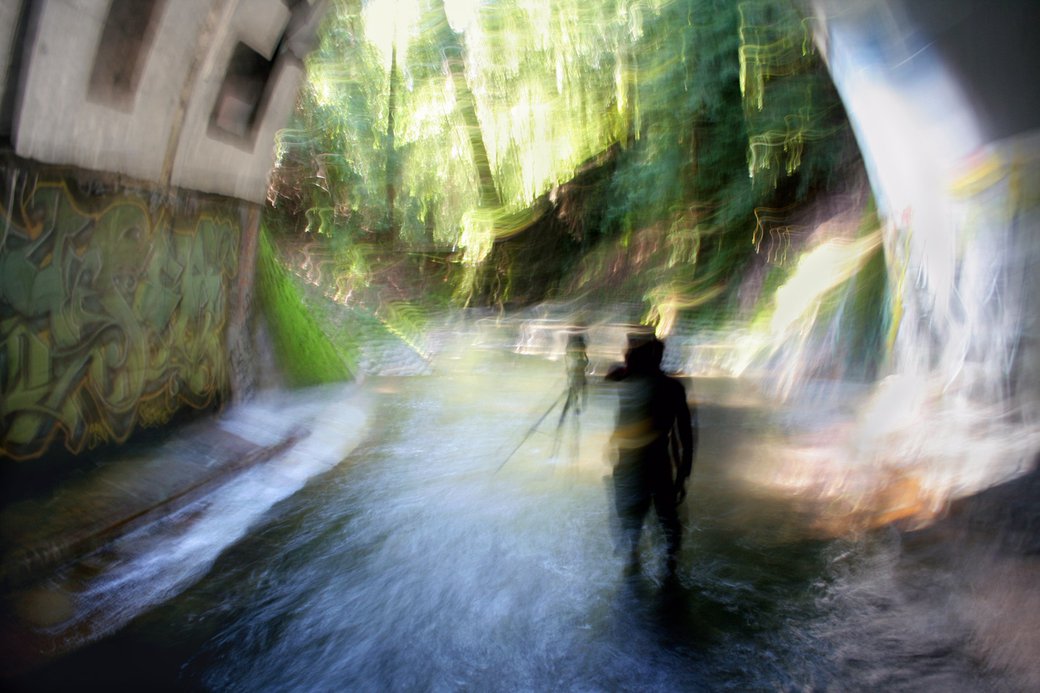
Explore the inspiring Bay Area
You’ll map new creative territory in the Bay Area, home to an incredible art and design scene. Pier 24 Photography, PhotoAlliance, SF Camerawork, Minnesota Street Project, and the San Francisco Museum of Modern Art are just a few of the many cultural institutions nearby. As you interrogate ethical, political, and social issues through your artwork, a wide range of photographic perspectives will inspire you to develop an inclusive, self-reflective practice.
Studios & Shops
Access to high-end equipment
Our curriculum challenges you to experiment with presentation and imagine future trajectories for your work. You’ll have access to studio spaces with top-of-the-line equipment, including 35mm, medium-format, large-format cameras, and digital and analog processing facilities.
On-campus spaces include a lighting studio, digital darkroom, dedicated digital classroom, photography equipment cage, black-and-white film processing station, and homeroom area. Off-site darkroom access is available nearby at First Exposures, which has weekly open lab hours.
The program’s Media Center has lenses, lighting kits, tripods, and other project-related equipment. Our collection of analog and digital cameras, including the examples listed below, is available for overnight and weekend checkout.
- Pentax 6x7 K5 IIS with 90mm lenses
- Mamiya 645 Pro TLs, with 80mm lenses
- Mamiya 645 AF, with 80mm lens
- Mamiya 7 rangefinders, with 80mm lenses
- Mamiya RZ67, with 110mm lens
- Four Hasselblads, with 80mm lenses
- Nikon D750 Digital Camera
- Nikon D850 Digital Camera
- Nikon Z6 Mirrorless Camera
- Sony A7r Digital Camera
- Sony A7rIII Digital Camera
- Canon 5Ds Digital Camera
- Canon 5D Mark IV Digital Camera
- Canon 5DSR Digital Camera
- Canon 5Ds Digital Camera
- Canon EOS RP Mirrorless Camera
- 35mm Nikon, Pentax, Olympus, and Canon
- Sinar 4x5A with 150mm lens
- Calumet 45N with 150mm lenses
- Cambo Legend 4x5 with 150mm lens
- 8x10 Field Camera
- Toyo Field 45AII with 150mm lens
- Phase One IQ3 60MP
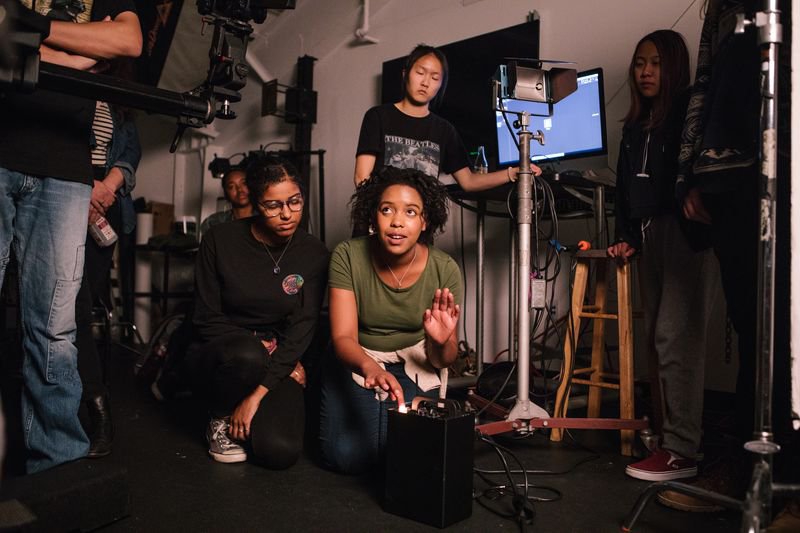
Work with professional editing software
Prepare for a versatile career in photography by mastering in-demand digital editing skills. You’ll use Adobe Photoshop, Lightroom, InDesign, Adobe Premiere Pro, Final Cut Pro by Apple, Capture One, SilverFast, and other software programs to achieve the highest quality results. Your digital skills will constantly evolve as industry standards change. Learning to be efficient and adaptable in our studios will help you hit the ground running in any professional setting. Many of our graduates have found work at local photography labs, studios, and other venues.
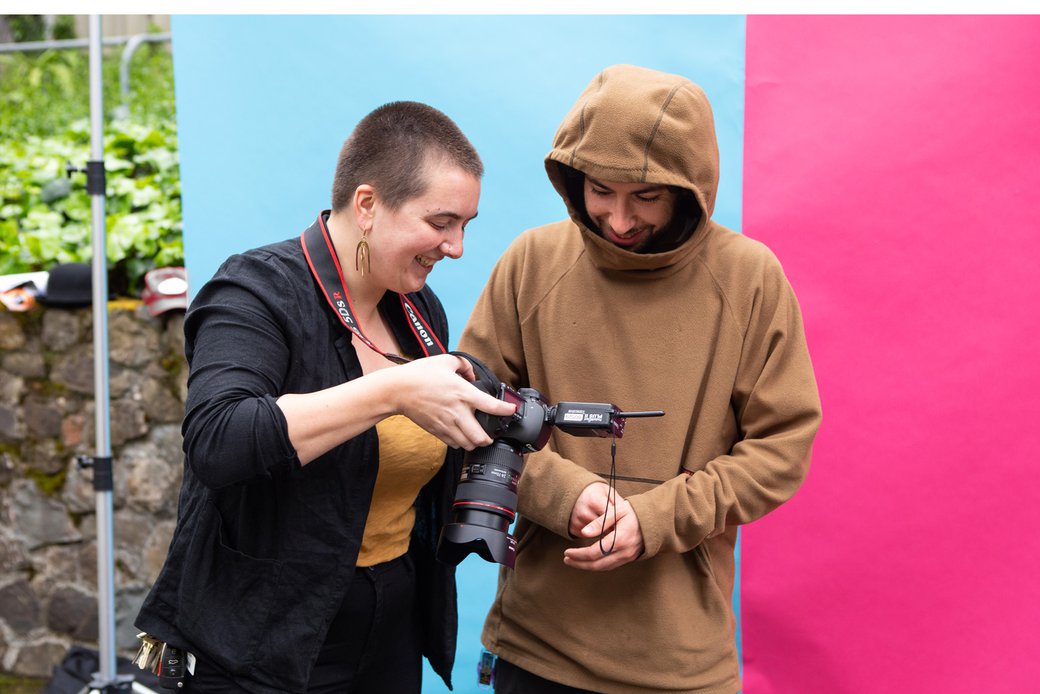
Take advanced workshops
Each semester, we invite a visiting artist or scholar to help students broaden their conceptual thinking and technical knowledge in advanced workshops. The topics, which vary each year, typically focus on media, technology, ethics, and representation. You’ll learn how to be self-reflective about your photographic intentions as you work across documentary and narrative practices. Recent visiting professors include Deana Lawson, Charlotte Cotton, Esther Teichmann, Todd Hido, Richard Barnes, Sita Bhaumik, Lindsey White, and Jacqueline Bates.
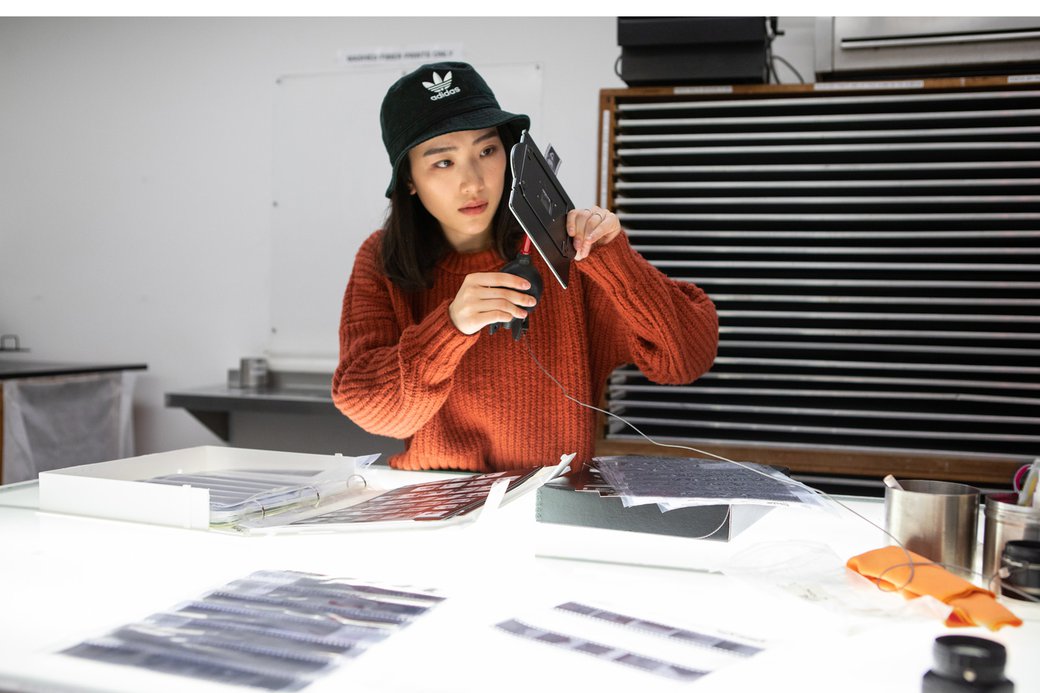
Create a culminating portfolio
Your conceptual investigations in the program will help you build a cohesive portfolio for graduation. Senior project tutorials, which give you the freedom to explore your areas of interest in depth, encourage risk-taking throughout the creative process. You’ll receive structured critique from your classmates and faculty mentors while you prepare to mount and present your work in CCA’s end-of-year exhibition.
Industry-standard and emerging tools
- 27-inch iMacs with 5K retina displays
- 13-inch Wacom Cintiq tablets
- Black-and-white printing and film development
- High-resolution scanners and inkjet printers
- Lighting Studio with Profoto equipment
- Tether shooting system
- Portable lighting kits
- Calumet 4x5 studio camera
- Phase One medium-format digital camera
- Epson Perfection V750 and V850 scanners
- Hasselblad Flextight scanners
Faculty
Mentors who are real-world visionaries
Imagine a New York Times photo editor critiquing your digital images, or a world-renowned photographer from the Smithsonian leading your large-format workshop. Our faculty are professional photographers and artists who help you refine your voice and style through one-on-one mentorship. You’ll also benefit from our in-classroom lecture series, which features six to eight artists each semester. Recent visitors include Sadie Barnette, Hank Willis Thomas, Meghann Riepenhoff, Carolyn Drake, Christopher Russell, and Curran Hatleberg.
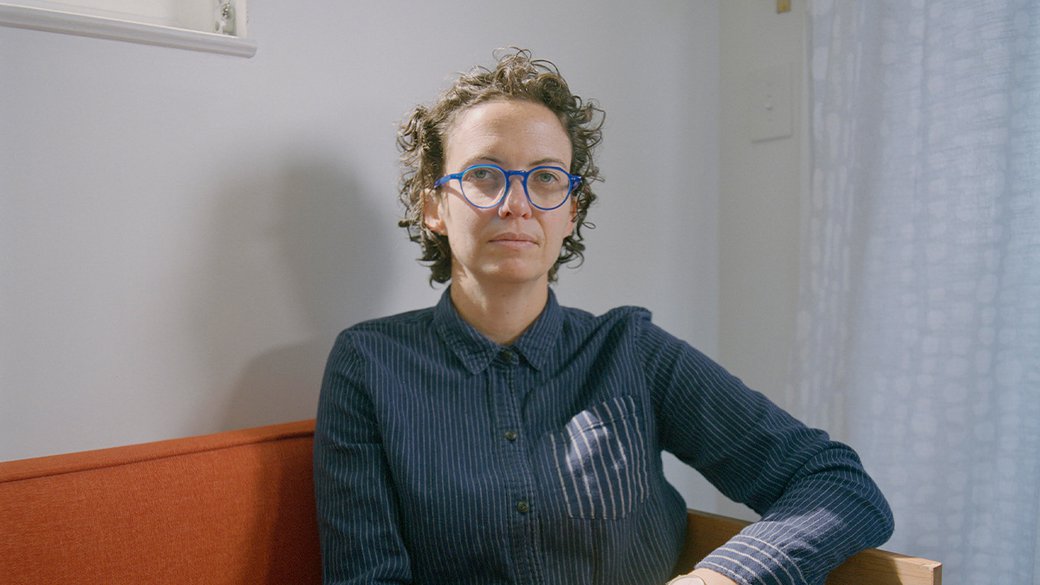
Aspen Mays, Chair of Photography, Printmedia, and Painting & Drawing. Photo by Taylor Johnson.
Chair Aspen Mays has been called a “Postmodern mystic.” Her work challenges the expectation of photography as a documentary and categorical medium, and her research explores the visualization of knowledge in both visual art and observational sciences. She is interested in the fantasy of objectivity in photographic processes, the artifacts and archives of these processes, and the desire for transcendence in the ordinary and prosaic.
Mays' solo exhibitions include Tengallon Sunflower and California Dreaming at Higher Pictures in New York and Every leaf on a tree at the Museum of Contemporary Art, Chicago. She was included in a national survey of contemporary art, State of the Art, at the Crystal Bridges Museum of American Art in Bentonville, Arkansas. Her work has been written about in Artforum, Art Papers, The New Yorker, and The New York Times. Mays’ publication (made in collaboration with Dan Boardman) Where We've Been, Where We're Going, Why? was shortlisted for the First Photobook Award by the Aperture Foundation and Paris Photo in 2016.
BA, University of North Carolina, Chapel Hill; MFA, School of the Art Institute of Chicago
Curriculum
We think with our hands
Hone your photographic perspective
Photography at CCA guides students in defining and developing their creative process and voice. From the fundamental aspects of the medium, such as composition, exposure, and lighting, to advanced skill sets in digital photography, the curriculum provides many opportunities to realize technical and aesthetic goals. Students can also work on intensive projects within an area of specialization. View sample courses.
Investigate ideas through every dimension
Before diving into their chosen major, every undergraduate participates in the First Year Experience. Students explore a wide range of materials and tools over the course of two semesters. Faculty from different disciplines guide studio projects, group critiques, and theoretical discussions, setting students up for success throughout their major coursework.
BFA Photography
Core Studio
- Drawing 1
- 3.0 units
- 2D, 3D, and 4D
- 9.0 units
Photography Major Requirements
- Tools 1: Black and White
- 3.0 units
- Tools 2: Intro to Digital
- 3.0 units
- Tools 3: Intermediate Digital
- 3.0 units
- Tools 4: Large Format and Lighting
- 3.0 units
- Investigations 1: Methods & Materials
- 3.0 units
- Investigations 2: Sequence & Context
- 3.0 units
- Media History 2: Contemporary Issues and Images
- 3.0 units
- Investigations 3: Process, Practice, Production
- 3.0 units
- Advanced Workshops
- 3.0 units
- Junior Tutorial: Photography
- 3.0 units
- Senior Project: Photography
- 6.0 units
Additional Studio Requirements
- Interdisciplinary Critique
- 3.0 units
- Upper Division Interdisciplinary Studio
- 3.0 units
- Critical Ethnic Studies Studio
- 3.0 units
- Studio Electives
- 15.0 units
Humanities & Sciences Requirements
- Writing 1
- 3.0 units
- Writing 2
- 3.0 units
- Introduction to the Arts
- 3.0 units
- Introduction to the Modern Arts
- 3.0 units
- Foundation in Critical Studies
- 3.0 units
- Media History: History of Photography
- 3.0 units
- Critical Ethnic Studies Seminar (2000 level)
- 3.0 units
- Literary and Performing Arts Studies (2000 level)
- 3.0 units
- Philosophy and Critical Theory (2000 level)
- 3.0 units
- Social Science/History (2000 level)
- 3.0 units
- Science/Math (2000 level)
- 3.0 units
- History of Art and Visual Culture (2000 level)
- 3.0 units
- Humanities and Sciences (2000 or 3000 level, at least 6 units must be 3000 level)
- 12.0 units
Total 120.0 units
Careers
Competitive skills for the professional world
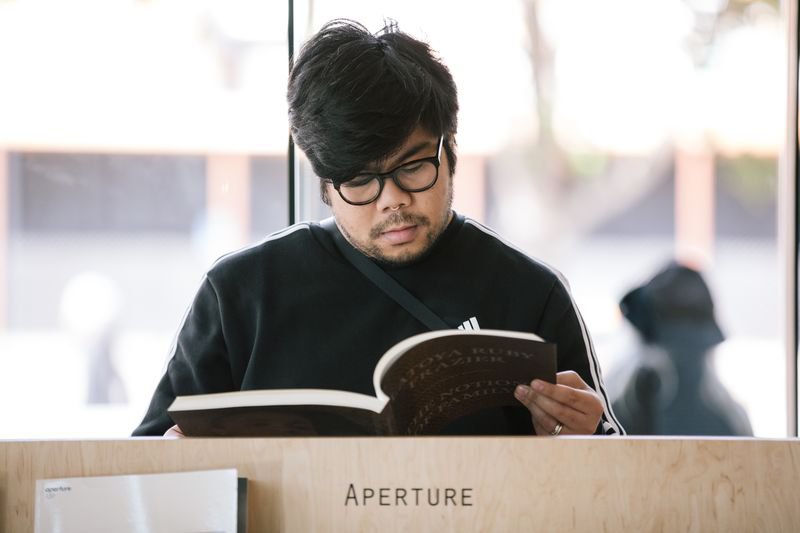
Our students graduate with extensive experience in photographic methods, theories, histories, and contemporary practices. Open to collaboration and familiar with cutting-edge digital tools, they find opportunities in commercial photography, exhibition design, art direction, and more. Some work in fast-paced technology and marketing environments, while others work for galleries and nonprofit arts organizations.
Potential career paths
- Independent artist
- Commercial photographer
- Photo editor
- Gallerist or employee at a museum
- Photography technician
- Artist’s assistant
- Publisher or employee in the publishing industry
- Employee at a tech company
- Educator
News & Events
Year-round artist lecture series
How to Apply
Focus your photography practice
We look for students who have something unique to say about their lives and the world around them. Our applicants are often just as interested in political image-making as they are in narrative representations. They’re detailed-oriented, willing to engage in important conversations, and excited about a career in photography that lets them make a real impact.
Find your creative community at CCA

